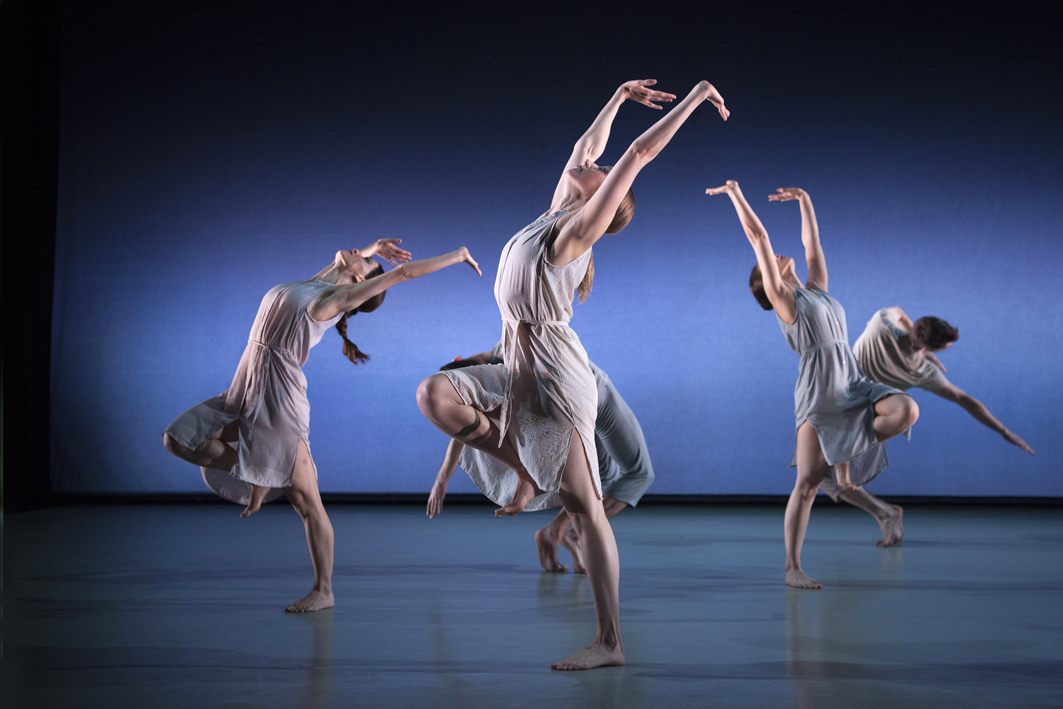
Richard Alston’s 2018 spring tour kicked off at the Theatre Royal, Bath last night with an enthusiastic audience warmly applauding the company at the curtain calls.
Alston has now been choreographing for a half century. His style, unlike Matthew Bourne’s theatrical approach, is more akin to that of Merce Cunningham, with whom he studied in the mid-1970’s. Cunningham eschewed narrative for instinctive movement, with randomness and arbitrariness considered as positive qualities. Alston’s work seems more contrived than this however, with modernistic forms and gestures running like clockwork – mathematically precise or gymnastic at times, rather than emotional, but occasionally soaring with clear statement. Always, movement is closely linked to the tempo, rhythm and feel of the music.
Throughout the three pieces performed tonight, Carnaval, Chacony and Gypsy Mixture, there was emphasis on the ensemble, with only fleeting moments devoted to solo performance. Staging was always stark, with an entirely empty space allowing for maximum movement. For the most part, lighting was simple, with low spots often projecting from the side of the stage, making for pronounced highlights and shadows.
With Carnaval, Alston explores the split personality of composer Robert Schuman. Accompanied throughout by the wonderful playing of Jason Ridgway on grand piano of the title piece, Liam Roddick as Eusebius and Nicholas Bodych as Florestan, (characters invented by Schuman to express the two sides of his troubled psyche), vie for the attention and affection of Clara Wieck, Schumann’s sweetheart, while the rest of the company party around them. Eusebius’s poise and balance served as perfect counterpoint to the more tempestuous twists of the more combustible Florestan, while Elly Braund’s Clara linked the two with an exquisitely light touch.
Chacony tackled still darker sides of the human heart. It was danced in two parts, first Purcell’s Chacony in G minor from 1680, then to Benjamin Britten’s 1948 tribute to Purcell, Chacony, from his 2nd String Quartet.
The ensemble, sumptuously attired in burgundy coloured tabards, followed the elegant and controlled structures of Purcell’s opening piece closely, finally sinking to the ground as one as if in a metaphorical fall from grace.
Britten was deeply affected by the experience of performing for survivors of WWII concentration camps before composing his tribute to Purcell. In his piece, sharp and uncompromising passages of stabbing cello herald an altogether different mood in which the now grey-clad dancers expressed new vulnerability, seeking comfort in touch, before an exhilarating end in which they walked in a line towards the front of the stage, heads held high as if in defiance and renewed belief.
Gypsy Mixture was our finale. After the stylisation that had proceeded, this felt like a joyous release. A deliciously syncopated Balkan-inspired mash-up of tracks from Electric Gypsyland provided the backdrop to a series of six uninhibited pieces in which individuals were let off the leash. Appearing in colourful print dresses and primary coloured T-shirts and trousers, the company delivered a hotpot of sizzling cameos. In particular, Nicholas Bodych owned the stage during Lest Sexy, the final dance of the night, while dancers Ihsaan de Banya and Monique Jonas frequently caught the eye with controlled energy and beautiful lines ★★★★☆ Simon Bishop 27th January 2018

